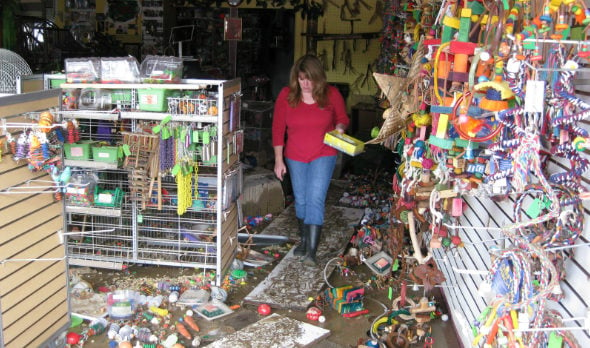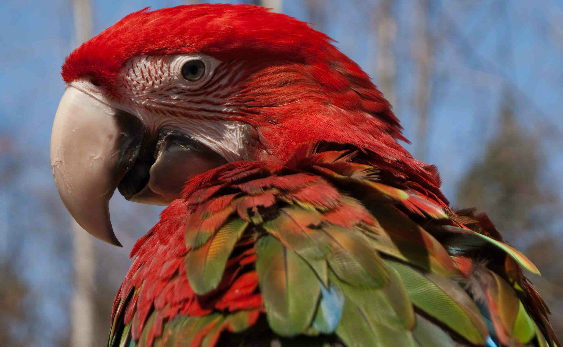
Disaster-a not so perfect storm…for a companion bird!
Be Prepaired
Despite the current disasters such as hurricanes, wild fires, and other maladies of Mother Nature that make international headlines, often the most overlooked disaster for a companion bird goes without notice.This is something that occurs often, yet, rarely makes a headline: it’s a storm of another kind. The kind of storm that can be sudden or perhaps it’s an event that’s actually brewing in the not so far distance.It’s the absence of the avian caretaker. Perhaps this is due to family emergency or unexpected death of the caretaker. Maybe it’s the slow decline of health on the part of the avian caretaker that creates comprises in the bird’s daily care. Unfortunately, a disaster from a companion parrot’s perspective is a disaster indeed…it is the interruption of life from that bird’s normal care.
We at HARI often hear about a pet bird or perhaps a collection of parrots, be it a breeder, a pet store, and even some parrot re-homing facilities in need of assistance due to human related emergencies. With that being said, we’d like to make a few suggestions and reminders for all of the avian community to take charge of their feathered companions before a “storm” actually strikes.
What can you do?
Take Charge!
First and foremost, avian caretakers need to take charge of their own flock. The HARI team encourages pet owners and large flock caretakers alike to keep records and prepare for emergencies. While some emergencies are incredibly unexpected, others are much like the storm in the not so far distance. Life has its challenges for all and if you feel as if the care of one bird or several is getting too difficult, ask for help.You know your bird or birds, and you know who you can count on. Take decisive steps in this matter to avoid someone else making decisions for you and your pets or flock.
Companion bird owners
Companion bird owners can very easily keep a supply box that includes everything needed for caring for their birds in case of emergency.Keep in mind that should an emergency arise that would give cause of for emergency personnel to enter a household, a simple notice on the refrigerator stating: Pet bird profile located in… let’s say, pantry, cupboard or whatever. This bit of information should include your avian veterinarian telephone, plus contact information for someone that can take over the care of your bird in your absence.Please feel free to review one of our older post , “HARI Approved First Aid Arsenal: Are You Ready?” for list of other items.
Strategies for Bird Clubs
Bird Clubs usually have a network and committee chairpersons set up for education, speaker, pet bird adoption and other services for their membership. Designate an emergency relief team and protocol. We’re not suggesting that a diehard watch dog team be in place, but perhaps a couple of members that can respectfully network within the bird club membership and be available to members in need.
Set up phone calling trees and encourage membership to have an emergency book on their pets filled out. To get started, make use of the Parrot Profile available from HARI which includes basic pertinent information about a particular bird. An Emergency or Disaster Relief committee might want to organize a presentation on this topic for a regular club meeting. Be sure to include an article on the subject in a monthly club newsletter for members unable to attend meetings.
Strategies for Avian Specialty Retailers & Pet Stores
Some of the best retailers are very familiar with their regular customers and the products they buy for their pets or flock.During the normal course of business it’s easy to lose track of every customer-but usually something will trigger that will make one think, especially when it comes to reordering a particular item because they know ‘so and so’ will be in and need…and then they discover that particular item is still on the shelf. A customer database, especially for routine grooming appointment reminders, is one way of not only creating a database for customer contacts, it’s a great way to keep in touch with the store’s area market and support community outreach projects that benefit the business.
Large Flock management
Whether it’s a breeding facility, a re-home facility or even a home with several parrots, large flock management emergency care is a little bit different. In extreme cases, municipal agencies are the ones who are called to these collections in the event of emergency.And, not every agency is equipped with knowledge of caring for exotic parrots.If the situation is temporary, the birds will be easier to manage without moving them from premise. At any rate, a response team will need to know location of food, particular dietary needs of species, as well other supplies such as nets, disinfectants, extra bowls, that are used in every day operation of a large flock management. Please note that most aviaries are very concerned with security as well as bio-security. Respect for the operation is essential to be of benefit overall. Ideally, the response team should be made up of experienced avian caretakers or facility avian veterinarian educated in large flock management. Efficiently operated large flock facilities will have record keeping system unique to the operation.
These types are record systems are often on computers; therefore, it’s suggested to have a hard copy of some kind that includes a map of facility with the location & identification of each bird, flight, cage as well as location of food, and extra supplies. Contact information for food supplier should be included as well to avoid interruption of the flock’s normal diet.
As avian caretakers, we’re very concerned with the quality of care of all parrot species in the avian community. By this post we’re not endorsing anyone particular group of the avian community, we just want the birds to be protected from storm damage…because it’s not always a Mother Nature event!



